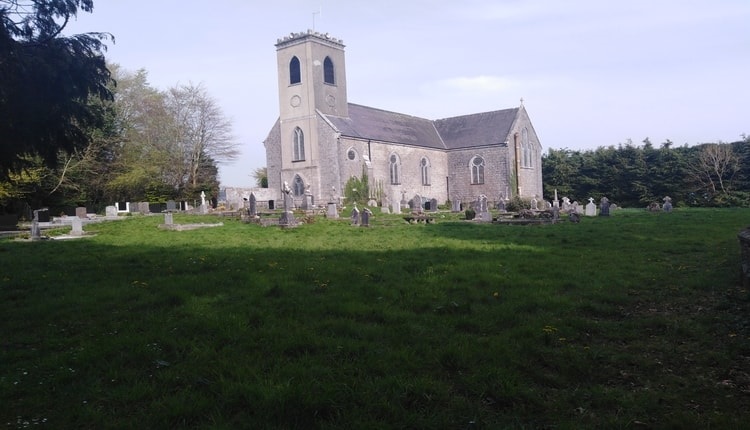Out Here | 7 | God as a Decision
St. Mary’s Church stands at the edge of a forest. A path goes from the wrought iron gate through the old graveyard of leaning headstones and into the pines. Sunlight glitters on the surface of the lake that lies behind the trees; a lake that was dug with picks and shovels and hands. I stop and look, then turn around and walk back up the path and through the gate, snapping photographs as I go. My footsteps and the click of the camera-shutter are the only sounds. There is no wind to stir the treetops, nor clouds to hide the sun. I walk out of the heat and into the coolness of the church. Where it is quiet and empty and dust dances in the sunlight that streams in through the stained glass windows. The stations of the cross hang on the walls. I walk down the nave and follow Jesus’s march up Calvary. No one ever explained to me how He died for our sins, what that actually meant. I look up at the soldiers driving the nails home. Then turn to look at the confession box. Where I made my first confession when I was too young to truly understand it.
For generations my hometown has knelt in there and admitted to sins we would never voice elsewhere. The thoughts and deeds that someone said God would hold against us when He returns “to judge the living and the dead.” From an early age we were taught that God knows right from wrong and we could only follow that path. No matter where it went.
I was taught the Lord’s judgement in my Catholic classroom. Where crucifixes hung on the cream-coloured walls and each day began with prayers we were only taught to repeat, not to understand. Every morning we stood in our uniforms to thank God for the sunshine and the day and for not taking our souls in the night. We grew up and took confirmation names and communion and confessed our sins. Learning every day to walk the way of our Lord without ever looking up. For fear of Him and His anger. That would be loosed on us if we were not humble and grateful.
Pride was the great sin. To question God was pride and to question His messengers was to question Him. So it was to be punished. We could not be beaten with rulers anymore. But we could be told to shut up, humiliated, dismissed. Questions are what make us human. It is our ability to wonder that built our cities, that painted our portraits and composed our symphonies. The very first “what if?” is what led to our upright gait and our first tools. And I was told when I was very young that it was a sin. A crime against God’s way for the world. Even though it turned against what I knew was right.
All Gods are moulded out of our questions. Some of our deities crawled out of the oceans or sprang from our first fires. Others flashed across black skies as forks of lightning. While others still were of the earth we first built our homes out of. There are as many Gods as there are perspectives, as many Heavens as there are souls. But they all share the same root, a common ancestor: Humanity’s questionings.

When we first recognised our reflections we saw a puzzle. And Gods were the solutions we created to solve it. David Ludden, Ph.D., explains in his article “Why Do People Believe in God?” that Gods evolved out of our “sense of agency.” That we see intention where there may not be any. This developed into “a tendency to infer intentionality in natural processes or inanimate objects.” Over time, what once were the spirits of the natural world – ocean and earth deities, woodland sprites and river demons – became the ways of humanity. Ludden says that as our cities developed with agriculture we developed Gods to watch over them. To ensure that the sinners amongst us were punished for their wrongs. Gods were no longer of the world. They were of how we wanted the world to be.
This is how God was changed from a way-lighting guardian to a judgement. He is no longer our teacher. He is our police and judge, our jury and executioner and the condemnatory public. When I was a teenager I stopped believing in Him. I had been told that I didn’t have that choice, that I had to accept God’s judgement of me. And that my own view of myself was insignificant beside His. Which is to say that it was the village’s and His messengers’ view of me that was important. Not what I saw in myself when I tried to answers my reflection’s riddles.
Over the years I came to realise that God is a decision. It is entirely up to the individual to decide if there is a God for them. What I had grown to resent in my teenage years was not God, but my lack of a choice. For when we cannot make choices we have no freedom. And that’s what God had come to represent for me; confinement and restrictions.
I was 18 when I shook off those restraints, the ties of my Catholic education. I still remember the prayers. And if I were to say them I would probably follow the same chanting rhythm I did in the classroom, when I had no choice but to follow their metre. Now, as I walk back down the nave of St. Mary’s Church, my footsteps are the only sound. And they tap out a soft rhythm on the carpet that runs down its length and out the door.
Featured Image Source: James Fleming
